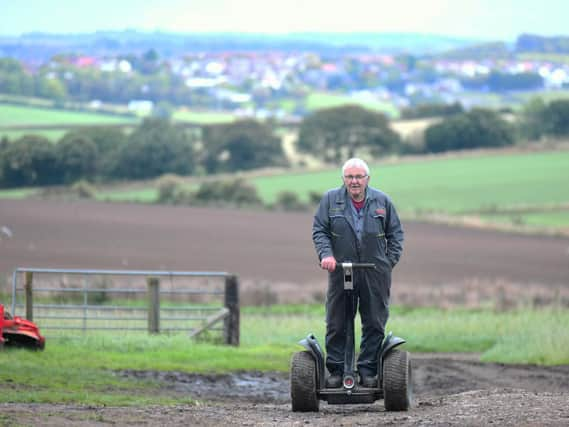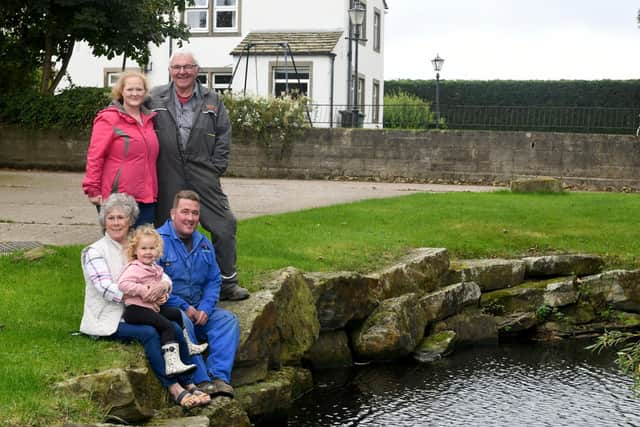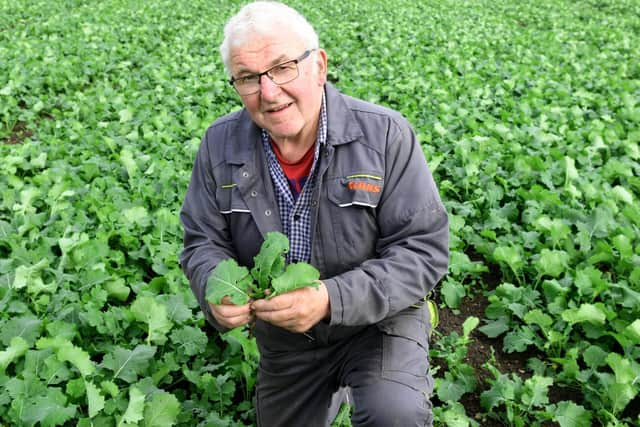Farm of the Week: Leaving dairying to set up Chidswell Farm Shop and selling 1,300 pork pies a week


John Broadfield and son Jo farm 320 acres at Chidswell Farm, Shaw Cross, near Dewsbury where they grow wheat, barley and oilseed rape as well as fattening pigs and cattle for their Chidswell Farm Shop, which came about through the cows going.
John said the switch from dairying happened almost overnight in 2009.
Advertisement
Hide AdAdvertisement
Hide Ad“We sold the whole of our pedigree herd of Holstein cows to a dairy farmer near Fleetwood who had them collected in four artic loads over two days. We went from milking to not milking very quickly. We weren’t doing very well off the milk price and the dairying equipment and buildings all needed significant investment. We had been working hard to make it work and were paying everyone else, but not earning anything ourselves.


“Jo was interested in the meat side. When he said about starting a farm shop I told him we would help him finance it, and we built most of it. The sale of the dairy cows got us started. We opened the shop on July 18, 2009."
Jo had studied for his HND in agriculture at Bishop Burton College and spent time away from the farm as a mechanic and erecting steel-framed farm buildings before returning when he was 25 in 2002.
Jo said the day they opened the farm shop he immediately knew it was right for him and that it has grown considerably since then.
Advertisement
Hide AdAdvertisement
Hide Ad“I’d worked in a butcher’s shop while I was at school and enjoyed it. The first day we opened I realised how much I liked the variety of farm work and the farm shop.


“I don’t want to be in the shop all the time, but I don’t want to not be in it at all. I like seeing the customers, the banter. You get to know people and what they want, which is a good cut of meat at a reasonable price. We know our market. We know what the people of Shaw Cross are looking for and that’s good value, good produce and good service.
“When we started, the shop was only one-third of the size it is today and we only had a few lines. We now have a great shop manager, Paul Barker, who runs it while Dad and I farm, plus a team of seven butchers and two bakers. We also sell thousands of pies. Each week we sell 1,300 pork pies.
Jo said the original plan, after opening their doors on a Saturday, was to open five days a week, Wednesday to Sunday, but that soon changed to six days a week.
Advertisement
Hide AdAdvertisement
Hide Ad“As trade grew we received more and more requests for cooked meats and pies and having initially outsourced pies and bakery goods we decided on bringing everything inside.”
Farming remains John’s number one priority and his regular visits to the livestock markets in York and Selby provide the stock that reaches the farm shop’s shelves some months later, but the farm is a mix of combinable crops and livestock fattening.
John said that at any one time there will be around 80 pigs and between 100-150 cattle at Chidswell.
“The farm supplies the shop with around three beasts a week and between eight to twelve pigs. We sometimes have store lambs on the farm, but we are mainly about pigs and cattle.
Advertisement
Hide AdAdvertisement
Hide Ad“Our pigs come in at around 12 weeks old and we buy largely heifers and steers on the cattle side dependent upon what is favourable in the market at the time. We don’t concentrate on one specific breed. We go for either traditional breeds like the Aberdeen Angus or Hereford, but also continentals. We’re just looking for good quality at the right price.”
John said this year’s winter wheat varieties Extase, Gleam and Gravity had averaged a creditable 4.5 tonnes per acre. The oilseed rape on 76 acres had yielded around 2 tonnes per acre, with the spring barley across 130 acres coming in at 1.5 tonnes.
“The land is all over clay with around 127 acres of ex-opencast. Overall it is decent Grade 2 land on average. We hadn’t wanted to put in spring barley but it was forced on us by the weather during last back end.”
Jo said that they were quick to get on drilling this year for next year’s crop.
Advertisement
Hide AdAdvertisement
Hide Ad“We started drilling winter wheat on September 16 and we just didn’t stop until we’d got it all in. We are hoping that by having drilled the oilseed rape as early as we could that we might avoid flea beetle. It devastated five acres in a 27-acre field this year.”
Jo said that they also make a lot of silage and use the barley for their own cattle feed. He added that between the farm, the farm shop and his family he never stops.
“Once I finish on the tractor or anything else I’m doing on the farm, I then have to come in and cash up in the shop. It’s all part and parcel of what we do. It’s not always easy but it works for us. During the pandemic it went crazy. We had customers queuing down the road.
“I think our customers like that we still do things the traditional way. We don’t have a checkout. Our butchers serve our customers. People like that face-to-face contact.”
Advertisement
Hide AdAdvertisement
Hide AdJohn and Jo said they are well aware of the parts that John’s wife and Jo’s partner, both called Melanie, play in the business.
“My wife, who is also a partner with myself and Jo, does a lot of the bookwork,” said John. “She also washes all the butchers’ smocks and aprons and Jo’s Melanie handles all the VAT work.
“Jo has made the shop buzz. I always said I’d support him in it, but that I never wanted to serve any customers. He’s great with people. It’s changed a lot from when my great grandfather, who was a coal miner, started on a smallholding at Heybeck Farm just over the valley. My father came here in 1953 and introduced livestock.
“My dad proved a bit of a trailblazer in dairy cows, putting in the first milking parlour in the area. Jo has blazed his own trail with the farm shop.”